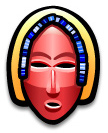
 |
Ethno::log |
|
Dept. of Publications, zephyrin, December 27, 2002 at 6:57:54 PM CET Catalogue on the History of Printing in the Middle East HANEBUTT-BENZ, EVA, DAGMAR GLASS, GEOFFREY ROPER AND THEO SMETS (eds.). 2002. Sprachen des Nahen Ostens und die Druckrevolution: eine interkulturelle Begegnung. Middle Eastern languages and the print revolution: a cross-cultural encounter. Westhofen: WVA-Verlag Skulima [ISBN: 3-936136-02-5; Price: € 128.-] This fully illustrated catalogue and collection of essays covers in some detail an important aspect of Middle Eastern history, and of the history of printing and publishing, which has not previously received the attention which it merits. The transition from manuscript to print culture in the languages and countries of the Middle East was as significant and as far-reaching in its effects as the equivalent shift in early modern Europe. Read more ... Comment
zephyrin, December 27, 2002 at 7:01:03 PM CET
Catalogue on the History of Printing in the Middle East
It took place, however, over a longer period, and was a more The other main Christian languages of the area, Syriac and The history of printing in all these languages is covered in some detail in the contributions to this volume, which are as follows: Hanebutt-Benz, E.: The beginnings of letterpress printing in the West Each of these is amply illustrated. They are followed by full-page plates (many in colour) depicting the 123 exhibits, which comprise the following: These illustrations reveal not only the intricacies of printing in The exhibits are all then given detailed descriptions in the catalogue, followed by bibliographies and indexes of places of printing. ... Link ... Comment |
The finest stuff from ethnology social/cultural anthropology and cyberanthropology. Collected with ceaseless endeavour by students and staff of the Institut für Ethnologie in München/Germany and countless others.
... about this website Online for 8342 days Last modified: 11/29/22, 8:56 PM Search
Browse by Category
Status
Youre not logged in ... Login
Menu
Calendar
Recent updates
Schade Oh, so bad! The
oldest anthropology blog is closing :(( It seems the whole...
by iglu01 (1/4/20, 4:05 PM)
-- Closed -- I think
it's time to close the weblog, it's already sleeping since...
by kerleone (12/29/19, 1:54 PM)
Stellenausschreibung des Max-Planck-Instituts für ethnologische
Forschung. Bewerbungsfrist: 15.02.2017 Das Max-Planck-Institut für ethnologische Forschung sucht Doktoranden/Doktorandinnen...
by HatEl (1/31/17, 9:11 AM)
Ethnosymposium in Halle (Saale): Call
for Contribution – 14.-17. Mai 2015 Call for Contribution –...
by normanschraepel (2/9/15, 3:35 PM)
Bruno Latour: Kosmokoloss. Eine Tragikomödie
über das Klima Der Hörspiel Pool von Bayern 2 hat...
by pietzler (11/21/14, 3:23 PM)
Send us suggestions
|
||||||||||||||||||||||||||||||||||||||||||||||||||||||||